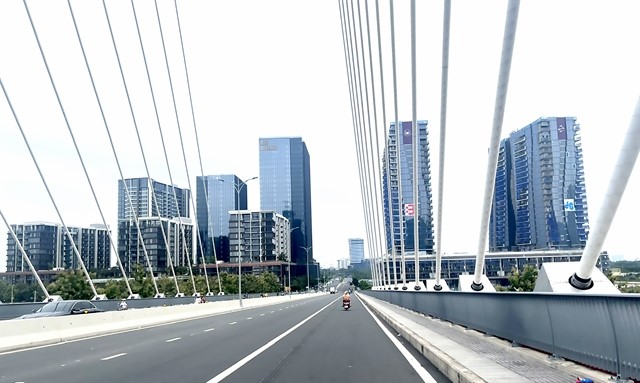Real estate revenue in HCM City reached VNĐ173 trillion (US$7 billion) in the first eight months of the year, up 6.1 per cent year-on-year, according to the HCM City Statistics Office.

Real estate revenue in HCM City reached VNĐ173 trillion (US$7 billion) in the first eight months of the year, up 6.1 per cent year-on-year, according to the HCM City Statistics Office.
The city’s real estate market has shown signs of recovery this year, with 3 per cent growth in the second quarter and 2.5 per cent in the first quarter, after a 6.4 per cent decline last year from 2022.
The market hit its lowest point in the first quarter of 2023 with a negative growth rate of 16.2 per cent.
The city’s strategic location and robust infrastructure make it an attractive investment destination for foreigners, particularly its real estate sector, said industry analysts.
Lê Hoàng Châu, chairman of the HCM City Real Estate Association (HoREA), said the most challenging phase of the market is likely over, thanks to supportive policies such as earlier access to financing options and reduced loan interest rates.
Industry analysts remain optimistic about the market’s outlook, expecting benefits from increased foreign direct investment in the real estate sector and revisions to the Land Law.
FDI in real estate
Competitive pricing within the property market, particularly in HCM City, has attracted the attention of numerous foreign investors.
Việt Nam reported $2.4 billion in pledged foreign investment for the real estate sector in the first eight months, according to the General Statistics Office.
The influx of foreign capital, constituting 18 per cent of the country’s total FDI, positions the property sector as the second most attractive sector following manufacturing.
A report by Cushman & Wakefield indicates a favourable outlook for foreign investment in the Vietnamese property sector from 2024 to 2026, driven by low interest rates and various supportive government policies.
Major investors from countries such as Singapore, Hong Kong (China), China, Japan, and South Korea are increasingly drawn to the high-end and luxury segments of Việt Nam.
Over 3,100 new property firms were established during the period, while 814 real estate enterprises exited the local market.
The number of licensed enterprises reached 958, with registered capital totaling VNĐ37.4 trillion, down 2.3 per cent year-on-year.
Credit growth
Nguyễn Đức Lệnh, deputy director of the State Bank of Vietnam's (SBV) HCM City branch, reported credit growth of 3.9 per cent in the city during the first seven months.
Of that total, real estate credit amounted to VNĐ1 trillion, up 5.5 per cent year-on-year, and accounts for 27.6 per cent of total outstanding credit.
Real estate credit, which includes social housing and commercial housing, makes up the largest share, or 57 per cent of the city's total outstanding credit.
Lending for social housing reached VNĐ2.5 trillion ($103.4 million) during the seven-month period, up 78 per cent over the end of 2022.
Industry analysts expect that the market will benefit from revisions to the Land Law, which took effect on August 1 and aims to resolve legal obstacles for as many as 1,000 projects nationwide.
The revisions are expected to enhance the supply of social housing by incentivising enterprises to invest in this segment.
The revised law permits overseas Vietnamese to purchase property in Việt Nam and secure ownership, thereby attracting further investment from this demographic.
However, Châu of HoREA has noted ongoing challenges, such as an oversupply of high-end housing and a scarcity of affordable housing, particularly social housing.
Experts have also warned of other ongoing challenges, including pressure related to debt repayment, fraud, and other financial scandals. — VNS





